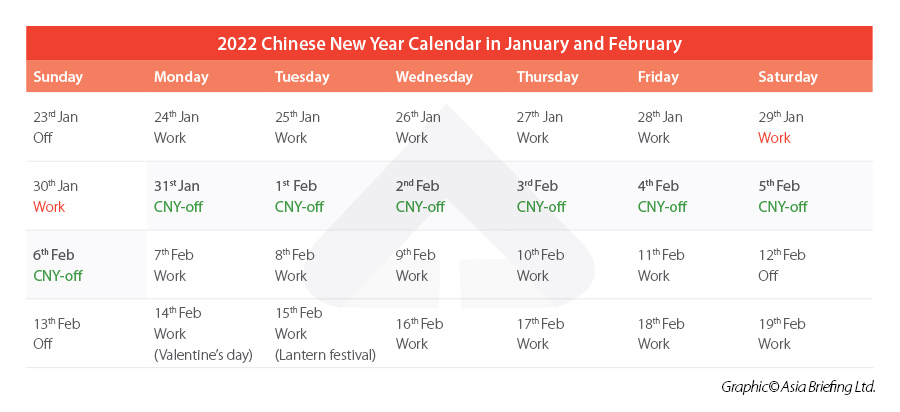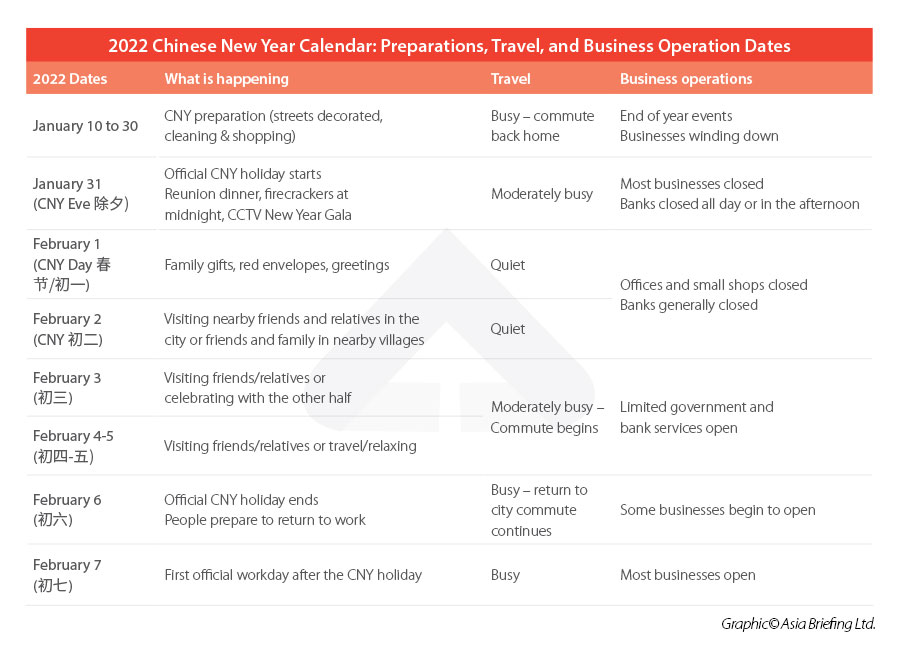2022 Chinese New Year: How Foreign Businesses Should Prepare In The COVID Context
What Is Chinese New Year And When Is It Celebrated In 2022?
Chinese New Year (CNY), also known as the Spring Festival or Lunar New Year, is the most anticipated and celebrated Chinese holiday. But for many businesses, it can be a disruptive time that requires advance planning and strategy.
In 2022, the seven-day CNY falls between January 31 and February 6 – after the CNY’s Eve on January 31, the Year of the Ox will pass into the Year of the Tiger on February 1. HR managers should note that to compensate for the long CNY holiday break, China marked January 29 (Saturday) and January 30 (Sunday) as additional official workdays.
Are There Movement Restrictions Anticipated During The 2022 Chinese New Year?
As of writing this article, the government has not imposed stringent travel restriction measures for the 2022 Chinese New Year as it did last year. In 2021 CNY, those returning from their travels were required to perform nucleic acid tests and completely self-isolate at home for a specified period.
Normally every CNY, millions of Chinese workers travel back to their hometown to reunite with their families and friends, as a tradition. Due to COVID-19, last year’s Spring Festival / CNY rush was the least busy in 18 years. During the 2021 CNY season, 870 million trips were taken – down 40.8 percent from 2020, and 70.9 percent from the 2019 pre-pandemic level.
In 2022 CNY, residents will be essentially allowed to travel across provinces during the holiday as long as their health codes and travel codes are green, with virtually no mandatory testing or home quarantine required. (However, it must be noted that the situation still depends on specific local policies and whether any outbreaks occur in or around your travel destination.)
For example, Beijing is tightening inbound travel restrictions after it reported its first Omicron case. During the period between January 22, 2022 and March 31, 2022, people traveling to or returning to Beijing will be required to hold negative nucleic acid test certificates from the last 48 hours and show a green code in the “Beijing Jiankang Bao” APP. Moreover, people traveling to or returning to Beijing (except for commuters) will be required to conduct another nucleic acid test within 72 hours of arrival in Beijing.
Therefore, before travelling or planning cross-region events, it is still advisable to confirm the COVID-19 testing and quarantine requirements with the local authority and hotels in your destination city.
So far, the highly transmissible Omicron variant has been reported in as least nine cities in six provincial-level regions – Beijing, Tianjin, Shanghai, Henan, Liaoning, and Guangdong – which has resulted in large and small lockdowns and control measures. Many citizens and business travelers are now holding back for fear that a sudden outbreak could disrupt their travel plans.
China State Railway Group, the state-owned railway passenger and cargo transportation services entity, estimated that passenger trips via railways will reach 280 million during the 40-day travel season (from January 27 to February 25, 2022), an increase of 28.5 percent from last year. Last year, China State Railway Group put its passenger trip estimates at 407 million, but the actual number was only 218 million.
Public Advised To Celebrate In Place
Facing the challenges from outbreaks of both Delta and Omicron variants of COVID-19, 29 Chinese provinces and cities have advocated citizens to “celebrate in place”. Many local governments have rolled out policies, such as distributing red envelopes, subsidies, and consumption vouchers, to retain employees during the holiday.
What Are The Trends Expected During This Year’s Spring Festival Period?
Holiday Consumption And Stay-at-home Economy
Due to the highly contagious Omicron variant and China’s zero-Covid strategy, holiday spending may be curtailed again this year, but some other business opportunities, such as in the stay-at-home economy may emerge. Normally, during the CNY holiday, locals used to pay in-person visits to relatives and friends, bringing them presents, called Nianhuo in Chinese, to celebrate the new year.
However, this year, as people are encouraged to stay at home, shoppers may spend less on presents and have more money for self-rewards. As a result, personal care products, apparel, and electronic products are likely to benefit. E-commerce and streaming platforms may expect a surge in website traffic.
Expectations That Government Support Will Boost Consumption
China’s economic growth has recently been dragged down by crises in the property market and sluggish consumer spending. Both imports and retail sales growth figures have been weaker than expected in recent months.
As the Spring Festival holiday approaches, the country’s top economic planner has rolled out some ideas on how to get people spending during the holiday, including upgrading online consumption, boosting consumption in rural areas, and stimulating the vitality of smart retail.
Despite existing challenges, this year’s Spring Festival shopping frenzy can still offer some special opportunities for some foreign brands to gain a foothold in the vast Chinese market.
What Are The International Travel Restrictions And Expected Supply Chain Disruptions During The 2022 CNY?
Beijing is putting more efforts on blocking the import of COVID positive cases from abroad due to the surge in COVID outbreaks across the world and the coming CNY holiday and February 2022 Winter Olympics games.
Civil Aviation Announcements
From January 1 to 12, the Civil Aviation Administration of China (CAAC) has suspended a total of 182 international flights, including nine flights between China and the US. The Chinese Embassy in the US announced on January 7, 2022 that passengers (both Chinese citizens and foreign citizens) traveling to China from the US will have to remain in the city of departure in the US for seven days to undergo health monitoring and COVID-19 testing before being able to board the China-bound flight.
Port Restrictions And Ongoing Epidemic Surveillance
In December, Beijing urged local governments to strengthen prevention and control measures in port cities and improve the epidemic surveillance and early warning systems. The lockdowns and COVID testing requirements in several port cities, including in Shenzhen and Ningbo, have seen truck drivers unable to haul cargo from factories to ships and vice versa, increasing disruptions to supply chains.
Omicron Factor
Now that cases of the Omicron variant have been recorded in Mainland China, global manufacturers, exporters, and shipping companies are becoming concerned about an increased risk of China not allowing ships to berth. Businesses should understand the situation and brace for any delays in the already strained global supply chains caused by the virus and the CNY holiday.
Traditional Business Closures
Normally, factories and suppliers will prepare for a seasonal slowdown before the CNY holiday. Although CNY officially lasts for seven days, many factories may shut down for a longer period to allow their workers to return home. Factory worker turnover rates can be high during this period as workers receive their end-of -year bonus ahead of the CNY.
2022 may be a bit different as some employers may take advantage of the domestic travel restrictions and local government policies to actually keep factories open, instead of closing for the break. This may ease some of the severe supply-chain disruptions.
In any case, foreign businesses with supply chains in China are advised to stay in touch with their suppliers who may face labor shortage and ensure that products are able to be shipped on time.
What’s more, leading up to the festival, many businesses, banks, and schools will be closed. The business implications of Chinese New Year do not end on the eighth day of the holiday. While the festival comes to a close, it often takes some time for things to fully return to normal again.
Here is a simplified guide to assist you during this period.
Tips For Doing Business Around The CNY Period
It is important to be aware that the effects of Chinese New Year will be felt long before January 31, as firms start to wind down their business a week or so prior to the first day of the festival.
1. Prepare Inventory Stock
In order to ensure that business operations are not adversely affected, inventory managers should ensure they obtain a detailed schedule of opening and closing dates well in advance of the Chinese New Year and order enough stock to see their business through the holiday period.
Foreign companies should also bear in mind that the Lunar New Year / Spring Festival public holiday is one of the year’s biggest shopping festivals, comparable to the Christmas season in many overseas markets.
Riccardo Benussi, Head of European Business Development at Dezan Shira & Associates’ Munich-Milan Office comments, “In the days and weeks leading up to the New Year, Chinese shoppers will rush to online and offline points of sale to purchase gifts for loved ones as well as delicious foods and drinks to great guests at their homes.”
In many consumer goods industries, businesses achieve their highest sales figures around the Lunar New Year.
“Foreign companies should prepare for a surge in demand at this time of the year, and appropriately stock up their China warehouses to ensure the rise in consumption is met in a timely and orderly fashion,” Benussi explains.
2. Quality Control
Meanwhile, as pre-festival production is increased to fill the ‘new year gap’, and pressure on suppliers rise, the quality of products can often suffer.
Issues in product quality control can sometimes spillover after the holiday period as high employee turnover requires new workers to be found and trained to replace those that didn’t return – meaning that delays are also possible.
To avoid this, it is advisable to increase monitoring and communication in the months leading up to, and after, the holidays in order to minimize any potential lapses.
Similar bottlenecks can occur in the shipping or logistics industries, so it is important to ensure that shipments are booked and at port well in advance of the shipment date.
Most Chinese port areas will be closed completely or will be operating at a limited capacity, so they are best avoided as much as possible at this time. During this period of the year, most aspects of Chinese logistics are faced with a staff shortage as people return home, and thus transporting goods can also become significantly more expensive.
3. Settle Payments Beforehand
To add to these difficulties, during the long holiday period limited payments can be processed to and from China or Hong Kong depending on banks and local policies. Often the most suitable course of action is to settle all payments before Chinese New Year, to avoid any potential problems with late payment fees.
Communicating with suppliers and planning ahead will go a long way to ensuring that effects on cash flow are minimized as far as possible.
4. Red Packet Etiquette
Red packets, or ‘hongbao’ in Mandarin and ‘lai see’ in Cantonese, are commonly given during the Chinese New Year Period. The significance of these red packets are the red envelopes themselves, which are seen to symbolize energy, happiness, and good luck. Therefore, when a red envelope is given, this is seen as sending good wishes, happiness, and luck to the receiver.
Traditionally, if you have started earning an income, you should be giving red packets to close family members that are unmarried and younger than you or retirees. However, this is a general rule only, and there is no hard-and-fast rule on who to give a red packet to as well as how much to give.
In Chinese companies, however, red envelopes are often given as a form of a 13th month salary — through issuing double pay in January, issuing a bonus over the Chinese New Year or via WeChat red envelopes. This is typically given on the last day of the working day before the Chinese New Year holiday.
Any company doing business in China should be prepared to adopt local practices over this festive period.
Prepare For The Holiday Season
Chinese New Year is a significant time of the year for not only individuals and families, but also businesses in China, as it is often a time to re-group, re-strategize, and re-staff for the upcoming year.
Planning in advance for this festival can help set your company apart from the rest, reducing significant problems in supply chain and logistics, while also maximizing opportunities that the festival can bring to your business.






Comments